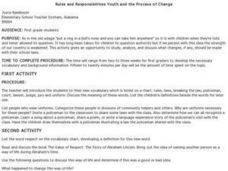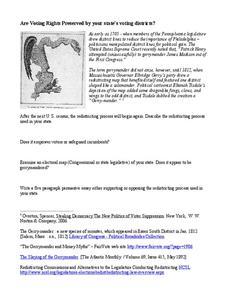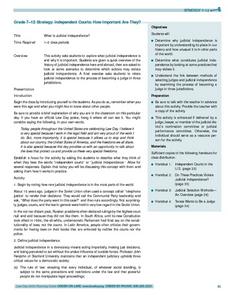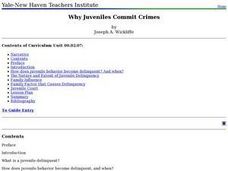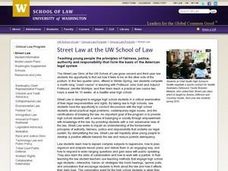Curated OER
Rules and Responsibilities Youth and the Process of Change
First graders learn vocabulary in regards to laws, courts, and policeman. They read and discuss the book, The Value of Respect: The Story of Abraham Lincoln. An attorney visits the classroom and discusses the roles of judges and juries.
State Bar of Texas
Miranda v. Arizona
You have the right to remain silent—but why? Scholars analyze the nature of what has become known as the Miranda Rights. A short video along with paired group work and discussion opens the issue of the rights of the accused upon arrest....
Curated OER
Building a Model Courtroom
Students construct a model of the Supreme Court's courtroom. They design the courtroom in such a way so that the architecture and furnishings in the courtroom represent the neutrality and power of the court.
Curated OER
Mock Trial
Students rewrite a traditional fairy tale to represent the viewpoint of the villain. They participate in a mock trial of that villain in which all regular court participants (judge, jury, defendant, witnesses, plaintiff, etc) play roles.
Curated OER
Why a Mock Trial?
Learners participate in a mock trial. They discover how U.S. courts resolve conflicts.
Curated OER
Supreme Court
Eleventh graders explore the redistricting process. In this American Government lesson, 11th graders examine the electoral map. Students write an essay posing an argument for the redistricting process.
Curated OER
Plea Bargaining
Students explore plea bargaining and list the advantages and disadvantages of it.
Curated OER
Judges in the Classroom
Students study the court process by participating in a mock trial. They demonstrate an understanding of the tort concept of host liability for injuries to third parties.
Curated OER
THE JUDICIAL BRANCH
Students create a series of drawings to show the process of how the Supreme Court does its work. The drawings may be in strip cartoon form or a series of separate illustrations.
Curated OER
Moot Court Preparation
Twelfth graders prepare themselves for a mock moot court. In groups, they are presented with an overview of each activity and research appellate cases related to the topic given to them. They identify regions of the country that have...
Curated OER
Affirmative Action
Young scholars explore policies concerning affirmative action. After reading affirmative action handouts, students use the internet and other resources to research information about affirmative action laws, court cases, and arguments....
Curated OER
Understanding the Significance of the Nationalization of the Bill of Rights
Eleventh graders study the impact of the Nationalization of the Bill of Rights upon criminal law. They analyze opposition to expansionist viewpoints that could possibly create more checks and balances on the state courts and analyze...
Curated OER
Bill of Rights and Lawmaking
Ninth graders consider how the Bill of Rights impacts the lawmaking process in the United States. In this Bill of Rights lesson plan, 9th graders discuss the amendments and their limitations. Students research the role of the Legislative...
Curated OER
Independent Courts: How Important Are They?
High schoolers investigate the importance of judicial independence and how it is exercised while conducting research to gather information using different resources. The teacher discusses the importance of Law Day. They also read the...
Curated OER
The Jury System
Students analyze Article III and the Seventh Amendment. In this US Justice lesson plan, students research the US jury system and complete a Student Jury questionnaire. Students will discuss the impact the implementation of the Jury...
Curated OER
The Legal Challenge of Human Rights Protection
Students identify the types and extent of human rights violations that occurred in El Salvador . They will also analyze the various laws and statutes that dictate the processes to protect and punish war crimes and human rights...
Curated OER
Civil liberties: Other freedoms
Students expore civil liberties. They identify and define legal rights. Students consider the impact of applying rights in criminal matters. They identify Canadians' political rights and suggest why they are essential to a democracy....
Curated OER
Why Juveniles Commit Crimes
Students examine the reasons why juveniles commit crimes. As a class, they watch movies showing juveniles committing crims and discuss the impact on societies. They take a field trip to adult and juvenile courts and compare their...
Curated OER
Teaching Juveniles How to Plan for The Future
Students in a special education class discover ways to effectively plan for the future. In groups, they research the programs and services available to them to discover the opportunities that await them. They read different sections of...
Curated OER
Stolen Car Mini-Trial
High schoolers participate in a mock trial about stolen cars. In groups, they take turns representing their clients and examining how a court operates. Other students act as the jury and share their reasons for the verdict they deliver.
Curated OER
Are You Listening?
To underscore the importance of practicing good listening skills class members engage in a series of activities that model poor listening skills. In pairs and then as a whole group, class members enact different, more positive techniques...
Curated OER
Synonyms and Antonyms
Mix up your writing lessons by having kids look at recent newspaper articles instead of their own work. They work in pairs and rewrite sports news articles using synonyms and antonyms for a set number of words. Then they share their work...
Curated OER
Racial Profiling
High schoolers debate both positions on the controversial topic of racial profiling with support for each and then develop a consensus position on how racial profiling as a law enforcement tool should be used.
Curated OER
Writing a Mystery Story
Students examine the elements of mystery stories and read Rage in Harlem. In reciprocal teaching groups, they discuss the author's development of the story, and complete dialectical journals.


